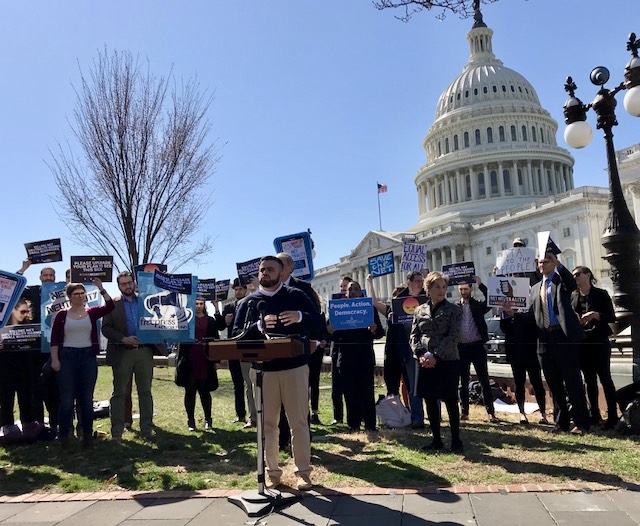This article was originally published by MAG-Net member, Voices for Racial Justice
I am grateful to the elders in my family line that have taught me the power of telling our stories. As a daughter of artist activists I was raised knowing that the resistance in your art and storytelling matters, and that there is great responsibility in telling stories that contest violence and injustice. I know this is right, but I also know that as activists, artists, organizers, culture makers, we can’t share our narratives and collective visions for our future without open, accessible platforms.

This past December the FCC voted to disband net neutrality. What does this mean? It means we would no longer have an open internet. Net Neutrality are rules that would make the internet easily accessible for everyone to use as an open platform to communicate. Net Neutrality rules protections prevent internet service providers from creating a hierarchy of access based on how much you pay for their services.
Prior to the December 14th vote to repeal net neutrality and end the open internet as we know it, 4 companies already had a monopoly on the vast majority of U.S. communications. Those corporations are AT&T, Verizon, Charter, and Comcast. An open internet ensures that all online content is treated equally. Without net neutrality this is non-existent. The implications of all this are much greater than just slow streaming for your Sunday binge-watching on Netflix.
So…why does this vote matter so much?
1. It’s an attack on the internet as a platform for activism and organizing.
Getting rid of net neutrality is a civil rights issue. The elimination of it is an affront to freedom of speech. With the repeal of net neutrality, internet providers can block and censor any content they wish. This means that if posts are deemed to be too political, news and reporting is considered too controversial—you get the picture—we can be prevented from accessing them.
This is a move to try to pull out a key platform in building narrative and action in our movements. Alicia Garza, Co-Founder of Black Lives Matter puts it clearly: “If it weren’t for net neutrality, fewer people would know that a movement for Black lives, dignity and freedom is growing. That makes net neutrality a key civil rights issue of our time: the power to communicate must belong to us all.”
2. It’s a racial justice issue and an attack on the working class.
Online communication is necessary for day to day participation in our society. Not only do we use it to communicate with each other, but we need it to apply for jobs, have access to government services, pay bills, just to give a few examples. There’s a huge digital divide that exists between rural and urban communities and across racial and class lines. Taking away net neutrality means taking broadband away from working class people, many of whom are people of color.
3. It privileges corporations over people.
The FCC vote to repeal net neutrality, was a vote in support of the interests of corporations even though the vast majority of public comments (tens of thousands) were in support of retaining the net neutrality rules that were already in place. In fact the NRA gifted FCC Chairman Ajit Pai an award and gun for eliminating net neutrality and for standing up “under pressure with grace, and dignity, and principled discipline.” The vote to end net neutrality protects corporations and ensures that they are able to profit off of the American public at exorbitant rates.

The end of an open internet will impact all of us. As many of us mobilize our communities on issues of racial and economic justice, we need an open internet as a space to organize, connect and show up for one another. So shouldn’t we show up and speak out to ensure we do not lose net neutrality?
Earlier this week, lawmakers introduced a resolution under the Congressional Review Act (CRA) which would undo the FCC’s net neutrality repeal. We need to urge our representatives today to support the CRA and defend the open internet that we need and depend on.
The timeline is tight to be able to restore net neutrality before protections end on April 23rd. Now is the time to be reaching out to your representatives and share a thank you to those who have been supportive of the CRA, and urge those who haven’t taken a stance to be on the right side of history. See battleforthenet.com for information on where your representatives stand. Join us and others around the country fighting to save an open internet and protecting the net neutrality rules. We have a right to an open internet, a platform that allows us to share stories of activists, artists, organizers, and culture makers. Join me today in urging our representatives in Congress to fight for our rights and to defend an open internet.



